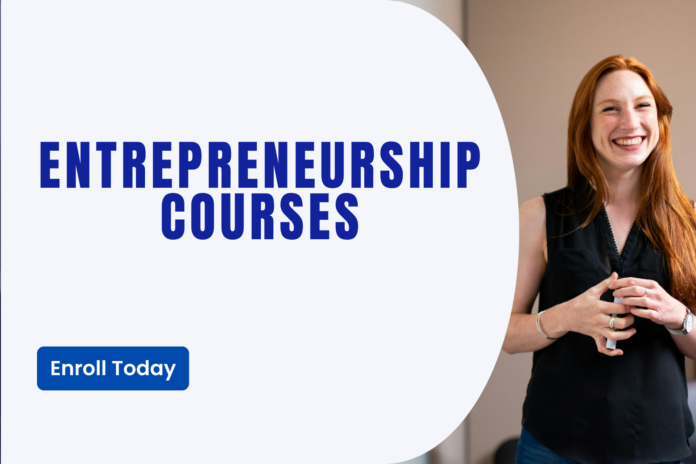The entrepreneurial journey is a thrilling yet challenging path that requires a solid foundation in business fundamentals. From crafting a compelling vision to securing crucial funding, mastering essential skills is paramount. This guide delves into the world of entrepreneurship courses, providing in-depth reviews of programs designed to equip aspiring entrepreneurs with the knowledge and tools needed to succeed. (Just for the record, I want to share with you that you can find your specific course in seconds using our AI-enabled search engine, Courseific.com)
Whether you’re a budding entrepreneur with a spark of an idea or a seasoned professional looking to refine your entrepreneurial acumen, these courses offer valuable insights into business planning, pitching, validation, and venture capital. Join us as we explore the educational landscape and identify courses that can propel your entrepreneurial aspirations.
“Now with Courseific you can search for online courses in seconds-Click this Text to find out“
Pitch Deck: How to Build and Present Your Pitch Deck

Creating an effective pitch deck is crucial for entrepreneurs seeking investment or partnerships. The course “Pitch Deck: How to Build and Present Your Pitch Deck” offers a step-by-step guide on crafting a compelling presentation that can capture the attention of potential investors and stakeholders.
Course Content
This course starts with the basics of pitch deck design, focusing on the key elements that should be included, such as problem statements, solutions, market analysis, and financial projections. It goes in-depth into each component, providing templates and examples to help you tailor your deck to your specific business.
Additionally, the course covers presentation techniques, including how to deliver your pitch with confidence and address questions from investors. Interactive workshops and feedback sessions are part of the curriculum, offering practical experience and personalized advice.
Pros: Comprehensive coverage of pitch deck creation, including practical examples and templates, focuses on presentation skills.
Cons: May be too focused on presentation rather than broader business strategy, limited coverage of financial modeling.
Ideal for: Entrepreneurs looking to secure funding, startup founders, and business professionals preparing for investor meetings.
Validate Your Business Idea
Validating a business idea is a critical step in ensuring that your product or service meets market needs. The course “Validate Your Business Idea” provides actionable insights and methods for testing your idea before committing significant resources.
Course Content
The course begins with an overview of the validation process, including defining your target market and understanding customer pain points. It then introduces various validation techniques such as surveys, interviews, and prototype testing.
Participants will learn how to analyze the feedback received to make data-driven decisions. The course also covers common pitfalls in validation and offers strategies to overcome them. Case studies of successful and failed business ideas provide practical context and learning opportunities.
Pros: Focuses on practical validation techniques, includes case studies for real-world insight, and offers strategies to avoid common mistakes.
Cons: May require additional resources for hands-on validation, less focus on advanced market research techniques.
Ideal for: Aspiring entrepreneurs, startup founders, and anyone looking to test and refine their business ideas.
14 Days Entrepreneur Challenge
The “14 Days Entrepreneur’s Challenge” is designed for those who want to kickstart their entrepreneurial journey with a structured, time-bound approach. This course promises to guide you through a series of tasks and challenges over 14 days to jumpstart your business idea.
Course Content
This course breaks down the entrepreneurial process into manageable daily tasks. Each day focuses on a different aspect of starting a business, such as market research, business planning, and networking. The challenge format keeps you engaged and accountable, with specific goals to achieve each day.
Additional resources, such as templates and checklists, are provided to help you complete the daily tasks efficiently. The course also includes motivational content and tips from successful entrepreneurs to keep you inspired throughout the challenge.
Pros: Structured daily tasks, keeps you accountable with a challenge format, includes motivational content and practical resources.
Cons: The intense 14-day format may be overwhelming for some and may not cover all aspects of entrepreneurship in depth.
Ideal for: New entrepreneurs, those looking for a structured approach to business planning, and individuals who thrive on challenges.
Seed VC Case Study: Real-Life Venture Capital Insights
Understanding venture capital from a practical perspective can be invaluable for entrepreneurs seeking funding. The “Seed VC Case Study: Real-Life Venture Capital Insights” course provides a detailed analysis of real-life venture capital scenarios and decisions.
Course Content
This course focuses on case studies of seed-stage investments, providing a behind-the-scenes look at how venture capitalists evaluate startups. It covers key aspects such as due diligence, valuation, and investment strategy.
Participants will learn how to analyze VC decisions and apply these insights to their funding strategies. The course also includes interviews with venture capitalists and entrepreneurs, offering diverse perspectives on the funding process.
Pros: Real-life case studies, insights from industry professionals, practical understanding of VC decision-making.
Cons: May not provide hands-on experience with VC funding, limited coverage of advanced funding topics.
Ideal for: Entrepreneurs seeking seed funding, those interested in venture capital, and individuals looking to understand the funding process from an investor’s perspective.
Pre-Seed Startup VC: From Idea to Investment
The “Pre-Seed Startup VC” course is designed to guide entrepreneurs through the early stages of securing venture capital for a pre-seed startup. It provides insights into preparing for and attracting early-stage investors.
Course Content
The course covers the essentials of preparing a pre-seed startup for investment, including crafting a compelling pitch, understanding what investors look for at this stage, and building a minimum viable product (MVP).
It also includes tips on networking with investors and leveraging your network for introductions. The course features expert interviews and practical exercises to help you refine your approach to securing early-stage funding.
Pros: Focuses on pre-seed stage funding, includes practical tips and expert insights, and offers guidance on building an MVP.
Cons: Limited focus on post-seed funding stages, may not cover all investor types.
Ideal for: Pre-seed stage entrepreneurs, startup founders looking for early-stage funding, and those preparing their pitch for initial investors.
Latin American Venture Capital
The “Latin American Venture Capital” course offers a deep dive into the venture capital landscape specific to Latin America. It provides insights into how venture capital operates in this region and what investors look for in Latin American startups.
Course Content
The course explores the unique aspects of the Latin American venture capital market, including key players, investment trends, and regional challenges. It covers case studies of successful and unsuccessful investments in Latin America, offering practical insights into what works and what doesn’t.
Participants will gain an understanding of the regional investment climate and learn strategies for attracting venture capital in Latin America. The course also includes interviews with regional investors and entrepreneurs.
Pros: Focus on the Latin American market, regional case studies, and insights from local investors and entrepreneurs.
Cons: Limited focus on non-Latin American markets; may not address global venture capital trends.
Ideal for: Entrepreneurs in Latin America, investors interested in the region, and individuals looking to understand the regional venture capital landscape.
Conclusion
Mastering the art of entrepreneurship requires a blend of creativity, strategic thinking, and a deep understanding of business fundamentals. The courses highlighted in this review offer valuable insights into the essential components of building a successful venture. From crafting compelling pitches to navigating the complex world of venture capital, these programs provide the tools and knowledge to propel your entrepreneurial journey.
Remember, entrepreneurship is a dynamic and challenging path. Continuous learning and adaptation are key to overcoming obstacles and achieving long-term success. By investing time in developing your entrepreneurial skills, you’re increasing your chances of building a thriving business. Embrace the entrepreneurial spirit, and let these courses be your guide on the path to success.

